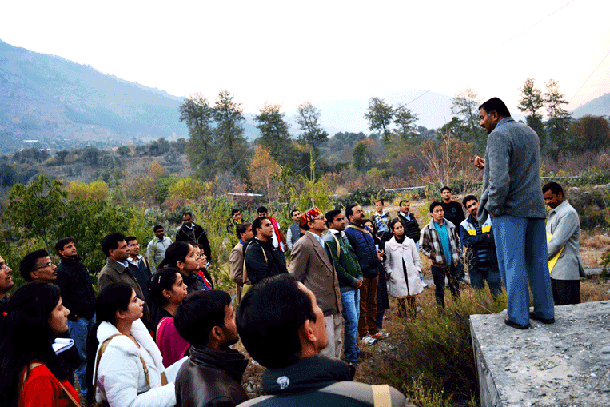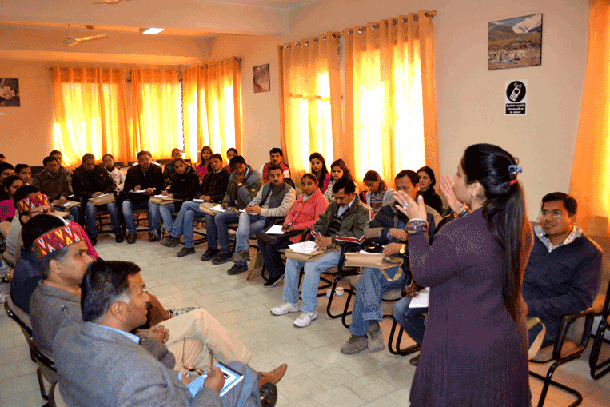Capacity building intervention for Youth on Climate Change issues in the Indian Himalayan Region
Climate change is a fundamental threat for sustainable economic development. The earth's climate is dynamic and always changing through a natural cycle. But the world is more worried about the climate change as it been adversely affected by human activities. Overwhelming scientific consensus indicates that human activities are the primary reason for recent climate change. Over the last century, the burning of fossil fuels has greatly increased the concentration of atmospheric carbon dioxide and other heat-trapping (or greenhouse) gases in the atmosphere.
The fifth Assessment Report (AR) of IPCC released recently clearly states that "Climate change poses challenges to growth and development in South Asia and will cause a decline in agricultural productivity in many sub-regions of Asia, for crops". The Indian Himalayan Region is one of the most fragile and vulnerable ecosystems which need immediate action to combat the visible impacts of climate variability on various sectors. The Himalayan Mountains are home to numerous species, including many threatened medicinal plants. Being one of the principal geological systems of the planet, the Himalayas have a global environmental significance. As many as nine river basins have their sources in the Himalayan region, of which the Ganga basin alone supports about 500 million people (nearly 8% of the global population).
India for the last six decades stood as the largest democracy in the world, which is also considered as the youngest nation. Demographic statistics reveal more than 50% under 25 years and about 30% between 10-25 years which roughly gives a figure of about 40% in the youth range of 16 - 30 years. This is a huge resource. Hence perception of youth with regard to climate change scenario is of utmost importance.
Considering the present scenario of research in the Himalayan region need was felt to motivate young researcher to take up research which will helps in tackling the present condition of Himalayan region of India which should lead to long term research as it restricted to lab and universities so initiative should be taken to implement it from lab to land.
In 2014 CHEA in collaboration with G.B. Pant Institute of Himalayan Environment and Development (GBPIHED), Kosi-Katarmal (Almora), an autonomous institute of Ministry of Environment of Forests, Government of India, as a Knowledge Partner and with support of Friedrich Ebert Stiftung (FES), Germany organised a series of focused learning events for the Youth of Indian Himalayas to understand and deal with issues related to Climate Change.
In this series of inaugural workshop on "Unlocking potential of youth in context of climate change in Indian Himalayan Region" was organised at Nainital (Uttarakhand) from 28th to 30th of April, 2014. The workshop was aimed to develop the understanding of 56 young participants of various universities, scientific institutes and non-profit organisation of Uttarakhand on climate change adaptation and mitigation.
A Himalayan Youth Forum was organised as another event by GBPIHED, Kosi-Katarmal (Almora), an autonomous institute of Ministry of Environment of Forests, Government of India. As many as 70 young researchers from various institutions and universities of all the 12 states of the Indian Himalayan Region participated in the two days event. Dr. P. P. Dhyani, Director GBPIHED has expressed his satisfaction over the enthusiastic participation of young researchers and is of opinion that the young researchers of Indian Himalayan Region should be promoted to undertake collaborative multi-sectoral research to fill the gap of data / knowledge deficiency.
The third workshop on "Youth and Climate Change" was organised at Mohal-Kullu in Himachal Pradesh from 1st to 3rd December, 2014 having GBPIHED as knowledge partner. In all 40 young researchers and civil society personnel participated in the three days workshop. These events saw a multi-disciplinary, cross sectoral group of young dynamic minds being oriented, sensitized and adequately informed about the projected impacts of Climate Change and the strategies and approaches commonly used to deal with the same. At every stage the learning process highlighted the unique and critical role youth needs to play in helping Indian Himalayan communities to Adapt to climate induced impacts and also contribute in policy advocacy for appropriate Mitigation measures at the State level.
"the encouraging results of the three events has reinforced the faith on potential of youth and this process will be continued in 2015 with partner organisation. The ultimate target is to develop a interaction forum of youth engaged in research or developmental intervention to share their learning, knowledge and understanding on mountain issues in which social media networking will play a critical role", says Dr. Pushkin Phartiyal, Executive Director of CHEA. The programme aims to also act as a bridge to bring together youths involved in research at various institutions/ universities and professional working with developmental organisations at field.


